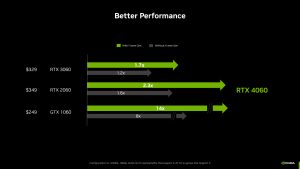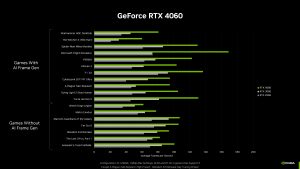On Nvidia's website, a new post has been published detailing the upcoming release of the GeForce RTX 4060 graphics card. According to the benchmarks shared, the GeForce RTX 4060 will deliver a 20% performance boost over the RTX 3060 in games without Frame Generation. On the other hand, with Frame Generation, the card offers 70% more performance.
Nvidia also states that the upcoming mid-range GPU is projected to be 60% faster than the RTX 2060 and up to 8 times faster than the GTX 1060. While the latter claim might seem somewhat exaggerated, it assumes DLSS is enabled on compatible hardware (the GTX 1060 doesn't support DLSS). Note that Nvidia's gaming performance comparisons are based on games running at 1080p resolution with maximum settings.
The RTX 4060 is touted as the desktop card with the lowest power requirements in the entire lineup. It has an average gaming power consumption of only 110W (115W TDP), which translates to approximately 2.2kWh per week. In comparison, the RTX 3060 consumes 170W and 3.5kWh per week. Nvidia provides an estimation of power and cost savings when transitioning from the RTX 3060 to the RTX 4060, amounting to $29-$54 for households in the US, £65-£130 for the UK, and €66-€132 for Germany. These savings were calculated by assuming 20 hours of gaming per week over a 4-year period.
The RTX 4060 is equipped with an AD107-300 GPU featuring 3072 CUDA cores, 8GB of GDDR6 memory, and a 128-bit memory bus. The graphics card's MSRP is set at $299.
Discuss on our Facebook page, HERE.
KitGuru says: Based on Nvidia's performance claims and the MSRP, would you recommend a RTX 4060 graphics card for a mid-range build?
 KitGuru KitGuru.net – Tech News | Hardware News | Hardware Reviews | IOS | Mobile | Gaming | Graphics Cards
KitGuru KitGuru.net – Tech News | Hardware News | Hardware Reviews | IOS | Mobile | Gaming | Graphics Cards




